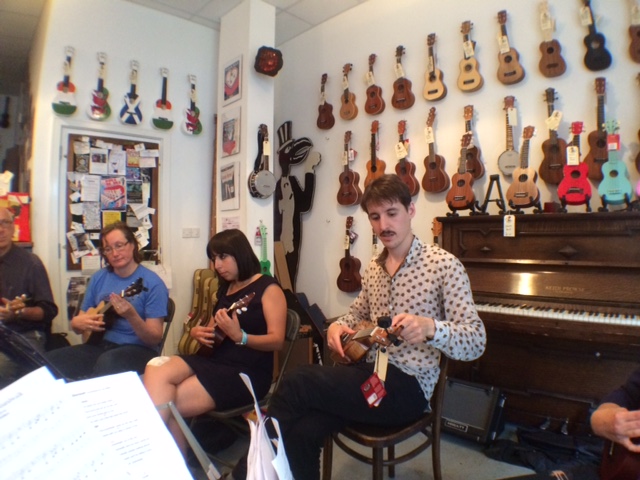What is this?
The mere sight alone promises curiosity: six men, seated, two women, instruments on their laps which look like newly-hatched baby guitars. Ukulele orchestra is the name of this bizarre appearance and wherever it plays it elicits frenetic applause from the audience everywhere.
It could almost be the Ukulele Orchestra of Great Britain.
British ukulele players indeed.
But what is that tell-tale touch of Denglish doing there?
Don’t miss it !!! , judged the SWR television. The Stuttgarter Zeitung titled ” The Ukulele rocks”, the Mannheimer Morgen spoke of a “brilliant performance of musical cabaret”, the Frankfurter Allgemeine Zeitung thought it was a “magic moment of musical comedy” and for the “Heilbronner Stimme” the whole show was “just great fun”. The musicians from London, Edinburgh, Nottingham and Glasgow just know how to capture the audience wherever they go.
But it doesn’t really matter, it is not going to be much different from the real thing.
You’d think they could have found a German or two, though.
The Intellectual Property Enterprise Court, part of the Chancery Division of the High Court, had to decide whether the United Kingdom Ukulele Orchestra, a German set-up with British players, had infringed the Ukulele Orchestra of Great Britain’s community trade mark and committed passing off and infringement of copyright.
The trade mark was not held to be distinctive, so the claim failed, except with regard to passing off.
UKUO was set up by Mr Clausen, his business partner Mr Tings and Mr Moss in 2009. The three of them agreed upon the name. Mr Clausen admitted that at that early stage he knew about UOGB and informed himself about them by looking at their website. He must have known of their style of dress and the nature of their performances and that by 2009 they had enjoyed a good deal of success, particularly in the UK and Germany. Mr Clausen must have known that the concert services to be provided by UKUO were similar to those of UOGB. He must also have known that as a matter of language ‘The United Kingdom Ukulele Orchestra’ would to most people mean very much the same thing as ‘The Ukulele Orchestra of Great Britain’, not least in Germany where UKUO was to be based.
In my view, in those circumstances Mr Clausen and his colleagues either knew or ought reasonably to have known that from a commercial standpoint they risked objection from UOGB. In pressing ahead without seeking the sanction of UOGB or any kind of accommodation with UOGB, they acted outside honest practices within the meaning of art.12(b).
There is an account of the case at The IPKat, which concludes:
Ultimately only the claim under passing off succeeded, and UOGB’s mark was deemed invalid. This Kat is by no means an aficionado of small instruments, and believes the fight was a surprising one, seeing as the market for ukulele performances cannot be that big (readers more inclined in this area of music can correct me here, of course). In the end, the case seems shut, and the two orchestras just might have to get along for the foreseeable future.
I must admit that my attempts to learn the ukulele were fun, particularly in the classes of the redoubtable Pete of the Duke of Uke, but the idea of a large number of ukuleles strumming away in unison seems a bit of a dead end.


the UOGB have been playing worldwide, professionally for 30 years and have sold out
concerts in venues such as the Sidney opera house, Carnegie hall, Dresden semper oper and the Royal Albert hall, by invitation and are responsible for the current wave
of the instrument’s popularity. TUKUO were cast together only a few years ago and only play the concert halls which have been hired by their promotion company. They were described by the judge in this case as “a low quality imitation”